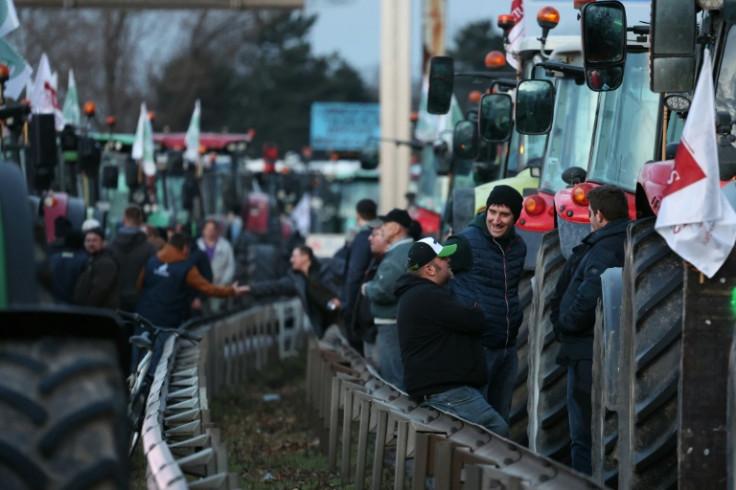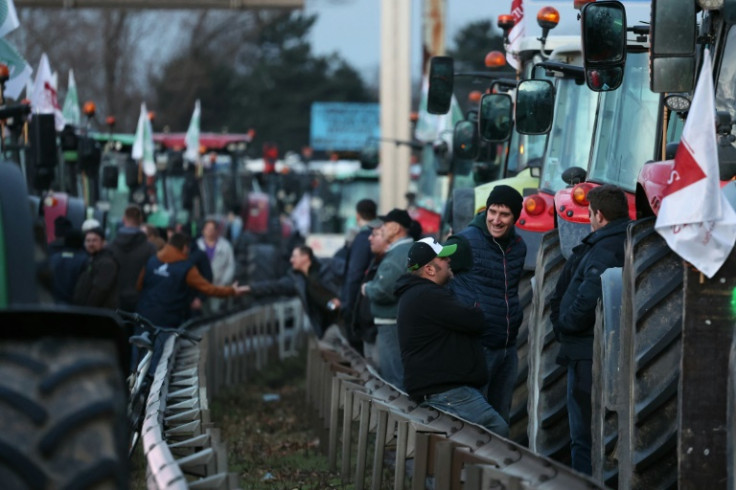Fuming French Farmers Pile Pressure On Paris
The French government on Thursday sought ways to end protests by farmers blocking motorways and demonstrating across the country after a fuel tax rise ignited long-standing grievances.

The French government on Thursday sought ways to end protests by farmers blocking motorways and demonstrating across the country after a fuel tax rise ignited long-standing grievances.
Newly installed Prime Minister Gabriel Attal summoned his economy, environment and agriculture ministers to confront his first crisis and decide on aid measures to fend off a possible blockade of the capital.
Attal would make "concrete proposals" to aid farmers on Friday, Agriculture Minister Marc Fesneau's office said after the talks.
Farmers blocked roads at 77 spots around France, the FNSEA union said. Its Paris region section and the Young Farmers (JA) called for a blockade of Paris.
Hundreds of tractors drove through Rennes and Nantes in the west of the country, blasting horns, brandishing mock gallows and setting off smoke bombs.

"We're totally fed up because we can no longer make a living from our profession," said Nathalie Posseme, a local Confederation Rurale union official.
"If people want quality food, they're going to have to pay for it," she added.
Elsewhere, hundreds of farmers blocked the M35 motorway near Strasbourg in the east while farmers on the A1 motorway outside Lille, close to the Belgian border, said they would spend the night on blockades.
Some routes were blocked around Avignon and Marseille in the south, according to traffic information website Bison Fute.
And in the southwest, there was a tractor go-slow around the Bordeaux ring road.
More aggressive protests included winegrowers forcing entry to two warehouses in the southern city of Beziers.
Some demonstrators near the southern city of Montelimar halted and emptied foreign trucks bringing Spanish, Moroccan or Bulgarian produce including tomatoes, peppers and avocados, FDSEA official Sandrine Roussin told AFP.
Farmers say they are being squeezed by a price battle between supermarkets and industrial buyers that is crushing their margins, and environmental rules on issues like leaving land fallow and pesticide use.
The last straw for many was a government decision to phase out a tax break on diesel fuel for farm machinery by 2030.

A new diesel tax rebate could be one of the government's forthcoming measures, while some lawmakers also want minimum prices introduced for farm produce.
The powerful FNSEA union demanded "immediate answers on pay", urgent aid for sectors worst hit by the crisis and, in the long term, "a plan to reduce regulations".
"We are talking about several hundred million euros," FNSEA chief Arnaud Rousseau told AFP late Wednesday.
President Emmanuel Macron's government is anxious to avoid a repeat of the massive 2018-19 "yellow vest" protests -- also triggered by a rise in diesel prices.
It has kept a nervous eye on recent protests by farmers in Germany, Poland and the Netherlands that have also raised concern in Brussels.
European Commission president Ursula von der Leyen acknowledged on Thursday "increasing division and polarisation" in the agri-food sector, saying there is a "sense of urgency that things have to improve".
Fishermen joined farmers protesting in Rennes, angered by a fishing ban along part of the Atlantic coast supposed to spare dolphins and porpoises. Owners of the 450 boats affected say they will lose tens of millions of euros.
In a bid to reduce tensions, Interior Minister Gerald Darmanin on Wednesday ordered local authorities to exercise "restraint" and deploy police only as a "last resort".
Speaking at a motorway roadblock, FNSEA head Rousseau said "at this stage" there were no plans to blockade Paris.
Young Farmers head Arnaud Gaillot said blockading the capital would be a "last resort", but urged the government to avoid "paralysing the country".
© Copyright AFP 2025. All rights reserved.





















